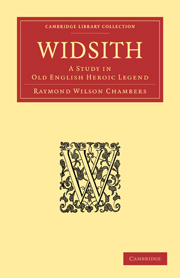Book contents
- Frontmatter
- PREFACE
- Contents
- CORRECTIONS AND ADDITIONAL NOTES
- CHAP. I WIDSITH AND THE GERMAN HEROIC AGE
- CHAP. II THE STORIES KNOWN TO WIDSITH: GOTHIC AND BURGUNDIAN HEROES
- CHAP. III THE STORIES KNOWN TO WIDSITH: TALES OF THE SEA-FOLK, OF THE FRANKS AND OF THE LOMBARDS
- CHAP. IV WIDSITH AND THE CRITICS
- CHAP. V THE GEOGRAPHY OF WIDSITH
- CHAP. VI THE LANGUAGE AND METRE OF WIDSITH
- CHAP. VII SUMMARY AND CONCLUSION
- TEXT OF WIDSITH, WITH NOTES
- APPENDIX
- MAPS AND INDEX
- Frontmatter
- PREFACE
- Contents
- CORRECTIONS AND ADDITIONAL NOTES
- CHAP. I WIDSITH AND THE GERMAN HEROIC AGE
- CHAP. II THE STORIES KNOWN TO WIDSITH: GOTHIC AND BURGUNDIAN HEROES
- CHAP. III THE STORIES KNOWN TO WIDSITH: TALES OF THE SEA-FOLK, OF THE FRANKS AND OF THE LOMBARDS
- CHAP. IV WIDSITH AND THE CRITICS
- CHAP. V THE GEOGRAPHY OF WIDSITH
- CHAP. VI THE LANGUAGE AND METRE OF WIDSITH
- CHAP. VII SUMMARY AND CONCLUSION
- TEXT OF WIDSITH, WITH NOTES
- APPENDIX
- MAPS AND INDEX
Summary
THE increasing interest shown during the last thirty years in Beowulf has, in England at least, not been extended to the other monuments of Old English heroic poetry: and that poetry has often, in consequence, been somewhat misjudged. The chief merit of Widsith is that it enables us to make a more correct estimate.
If Widsith had been, as some have thought it, an authentic record of a visit to the court of Ermanaric, it would have been valuable: though hardly so valuable as the account left by Priscus of his visit to the court of Attila, an account which nevertheless few trouble to read. But Widsith is more to us than any record of fourth or fifth century travel could have been: it is a record of lost heroic song. As one of its earliest editors said, with sound sense, if in questionable Latin, Discimus ex eo, quot carmina temporum injuriâ nos amisimus.
Another advantage to be drawn from a study of Widsith is that here we find the older scholars at their best. It is remarkable, considering the means at his disposal, how good are the comments even of the despised Conybeare, and still more is this true of those of Kemble, Leo, Lappenberg, Ettmüller, and in more recent days, of Möller, Ten Brink, and Müllenhoff. I hope that I have shown, both in dealing with the Harlung story and the Offa story, that my reverence for Müllenhoff is not a superstitious one.
- Type
- Chapter
- Information
- WidsithA Study in Old English Heroic Legend, pp. vii - xPublisher: Cambridge University PressPrint publication year: 2010First published in: 1912



